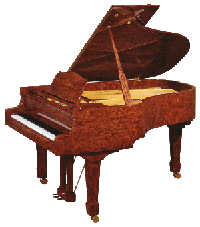With the challenges of the economy, there are so many pianos for sale. Many are selling for very cheap prices, so now is the time to buy. Even dealers are willing to discount pianos to the absolute minimum, often just to keep the competition from making the sale. But, how are you to know if there’s something wrong inside that might later come back to bite you? Here are some hints for doing your own evaluation:
1. Play every key carefully to see that they bounce back up. Press the damper pedal (right) and play the keys. If they seem to be sluggish, you’ll have a repair bill for that.
2. Open up the top (upright pianos) or remove the music desk (grands) and watch what’s going on when you press the keys. Check for deep grooves on the hammer tips where they hit the strings. If there are deep grooves, the hammers will have to be sanded to reshape them.
3. If you have an upright, you can gently move the hammers side to side. If they feel loose, there might be a couple of hours of repair needed.
4. See if the keys are loose. Move them side to side to check them for looseness. Do they appear well spaced, or do you see the gaps between the keys uneven? Do they tip to one side? If you sight along the keys, are the of the same level, or do they look like the waves of the ocean?
5. Check to see how the pedals work. Press the damper pedal (right) and watch the dampers. Dampers are resting on the strings until you press they key. Watch to see if the dampers all move simultaneously when you press the damper pedal. Does the sound immediately stop when you take your foot off the pedal? If not, there’s some adjustment that needs to be done.
6. Do you hear a full sound coming from the bass notes? Or, does it sound “tubby” when you play those keys? If so, they may need replacement, usually $600-800.
7. Do you hear any buzzes or unusual sounds when you press certain keys? Old pianos can have glue joints that have failed, and that can cause buzzing especially in the soundboard.
8. Does the tone of the piano sound pleasing? If it’s too bright or harsh sounding, you may need some voicing to tame the sound and make it more mellow. Be aware that only so much can be done about the tone. Don’t expect a Steinway to sound like a Yamaha or vice-versa. Better to get something that you like without having to do much work on it.
9. Check the finish on the piano. Does it appear like the scales on an alligator? This indicates it may need refinishing. If the piano has a very glossy finish, you will probably notice any small defects on the piano. Repairing gloss black finishes is fairly easy, but if it’s wood color, repairing damage can be expensive, and will probably be noticeable even after it is repaired.
10. Make sure you LOvE the piano! You will likely have it for many years.
Best of Luck finding your dream piano. Call me for any questions you may have.



